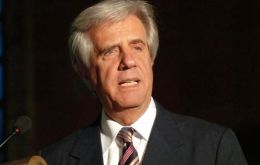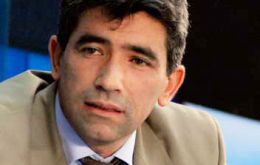MercoPress. South Atlantic News Agency
Tag: National Party (Uruguay)
-
Saturday, October 18th 2014 - 07:39 UTC
Uruguay's presidential election too close and 'unpredictable', argue pollsters

The strong economy and the good image of the incumbent presidential candidate Tabare Vazquez are not sufficient for Uruguay's ruling coalition Broad Front to ensure a third consecutive mandate next Sunday 26 October, according to the country's main pollsters, who underlined that the election result at this stage is too close and 'unpredictable'.
-
Wednesday, October 8th 2014 - 08:24 UTC
Uruguay presidential race to be decided in runoff in November seems confirmed by latest poll

A run off in November to elect Uruguay's president seems most certain because none of the two leading candidates will manage a majority in the first round on 26 October, according to the latest public opinion poll.
-
Thursday, October 2nd 2014 - 07:47 UTC
Uruguay's presidential election at the end of October 'too tight to call'

With less than four weeks to 26 October presidential election in Uruguay, the leading candidates are in a neck to neck race, which will demand a run off at the end of November with the result is too close to call, although two of the latest opinion polls believe that the ruling coalition could still scratch through.
-
Friday, June 13th 2014 - 08:37 UTC
Uruguay's main parties completed their presidential tickets for 26 October

Uruguay's ruling coalition and the main opposition National party have finally worked out their presidential tickets for October's general election, following on the results, and subsequent negotiations, of the June first primary elections.
-
Tuesday, June 3rd 2014 - 05:51 UTC
Uruguay's primaries give birth to a new young leader in the ruling coalition

Yet more surprises from last Sunday's primaries in Uruguay to choose candidates for the October presidential election. Not only did the main opposition vote overwhelmingly for renewal, but now it has emerged that in the ruling coalition, which suffers from a generation of Jurassic leaders, a young challenger has emerged as the most voted and is now demanding a place in the presidential ticket.
-
Monday, June 2nd 2014 - 07:13 UTC
Vazquez, Lacalle Pou and Bordaberry: one the three will be Uruguay's next president

Sunday's primaries in Uruguay cleared the way for the candidates of the four parties with legislative representation that will be disputing the presidential election next October 26, with a run-off a month later if none of them manages 50% plus one of ballots.
-
Friday, May 30th 2014 - 05:19 UTC
Uruguay parties chose presidential candidates in next Sunday's primaries

Uruguay closed on Thursday the primaries election campaign ahead of Sunday's vote when the different parties will be choosing their candidates for the big presidential contest on the last Sunday of October. Whoever is elected in October or in the November run-off will succeed President Jose Mujica on March 2015.
-
Monday, June 24th 2013 - 19:09 UTC
Abortion law in Uruguay stands; insufficient support to force a repeal referendum

A liberal abortion law in Uruguay withstood a challenge Sunday as Uruguayan opponents failed to attract enough votes in a consultation ballot to force a national referendum on repealing it.
-
Thursday, September 6th 2012 - 06:15 UTC
August anticipates that Uruguay’s annual inflation out of target at 8%

Consumer prices in Uruguay rose 0.93% during August, above expectations and leaving the Central bank with not much margin to apply counter measures. In the twelve months to August inflation was 7.88%, up from July’s 7.48%.
-
Tuesday, May 11th 2010 - 04:10 UTC
“Wake Up Call” for Uruguay’s Ruling Coalition in Sunday’s Municipal Elections

Uruguay’s ruling coalition received a “wake up call” from voters during last Sunday’s municipal elections, admitted Vice President Danilo Astori. The Broad Front managed to retain five, probably six, of the 19 regional governments (departments) in which Uruguay is divided, while the opposition took the rest.
